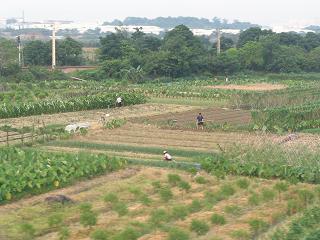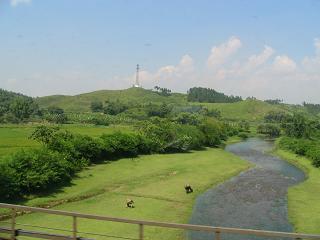Train ride from Beijing to Hong Kong
 I had said before, I had to go to Hong Kong for my Visa. Actually all I had to do was go to Hong Kong and turn right around. To travel 2300 kilometers and twenty six hours to get a stamp in red ink on my passport, to show that I had been out of the country. Then to travel the same distance to get back.
I had said before, I had to go to Hong Kong for my Visa. Actually all I had to do was go to Hong Kong and turn right around. To travel 2300 kilometers and twenty six hours to get a stamp in red ink on my passport, to show that I had been out of the country. Then to travel the same distance to get back.I left late on Monday morning and saw I had little time before I needed to be at the station. I heard that food on the train was expensive so I had to buy some. I picked up bananas, walnuts, dried raisins, yogurt, a loaf of bread, and water and threw it into my bag.
 Check-in at the train station still requires that you put your bag through the x-ray machines checked by security. Since going to Hong Kong is like leaving the country, you have to show your passport and fill out a departure card before leaving. It’s like going through immigration at the airport, but at the train station. As soon as you are on the platform there are men dressed more like military officers than train station attendants who stand at full attention by the entrance. People file into the train. The difference between the foreigners and Chinese is obvious. Many young backpacking foreigners take the trains. They look like they have been hiking mountains all day in their scruffy outdoor clothes, hiking sandals, and massive backpacks, which look like they are carrying a tent and full camping supplies. The trains are the way to go for people like that and me who have time but short on money to buy plane tickets.
Check-in at the train station still requires that you put your bag through the x-ray machines checked by security. Since going to Hong Kong is like leaving the country, you have to show your passport and fill out a departure card before leaving. It’s like going through immigration at the airport, but at the train station. As soon as you are on the platform there are men dressed more like military officers than train station attendants who stand at full attention by the entrance. People file into the train. The difference between the foreigners and Chinese is obvious. Many young backpacking foreigners take the trains. They look like they have been hiking mountains all day in their scruffy outdoor clothes, hiking sandals, and massive backpacks, which look like they are carrying a tent and full camping supplies. The trains are the way to go for people like that and me who have time but short on money to buy plane tickets. I saved about half the cost of a round trip plane ticket by using the train. I also hoped by taking the train I could relax, read, talk with some people and see the countryside. It would an interesting experience.
I saved about half the cost of a round trip plane ticket by using the train. I also hoped by taking the train I could relax, read, talk with some people and see the countryside. It would an interesting experience. One can really see the differences in the landscape going from the north to the south of China. In the Northern heartland the land is so flat for miles and miles around the Huang-He, translated as the Yellow River, so called because of the yellow sediment. In the North the fields are a faded yellow and brown, flat and wide stretching into the horizon. I saw people working in the dusty fields with hoes and field tools. That looked like backbreaking work. There were men and women, spaced about 20 yards from each other doing all kinds of work. Some scattering seeds, digging at weeds, others with spray cans on their back, probably insecticides of some sort.
One can really see the differences in the landscape going from the north to the south of China. In the Northern heartland the land is so flat for miles and miles around the Huang-He, translated as the Yellow River, so called because of the yellow sediment. In the North the fields are a faded yellow and brown, flat and wide stretching into the horizon. I saw people working in the dusty fields with hoes and field tools. That looked like backbreaking work. There were men and women, spaced about 20 yards from each other doing all kinds of work. Some scattering seeds, digging at weeds, others with spray cans on their back, probably insecticides of some sort. The south is green and lush, trees and plants with thick green leaves, rivers and mountains. Farmers in the south grew rice. The rice paddies are not laid out so square and wide like in the north.
The south is green and lush, trees and plants with thick green leaves, rivers and mountains. Farmers in the south grew rice. The rice paddies are not laid out so square and wide like in the north.Again, I saw little of tractors and farm machinery. I saw people behind plows and water oxen. I saw people bent over sticking rice into the wet earth. They wore those wide brimmed grass hats and loose fitting clothing reminiscent of south east Asian farmers. That looked like hard hard work.
 The train would stop in a few places and passengers could get off and stretch their legs and breathe some fresh air. Outside, you could feel the warm, bordering on hot, moist air. The sky was blue and air fresh, but the moisture was thick enough to make movement feel like a chore.
The train would stop in a few places and passengers could get off and stretch their legs and breathe some fresh air. Outside, you could feel the warm, bordering on hot, moist air. The sky was blue and air fresh, but the moisture was thick enough to make movement feel like a chore.As we neared Guangdong province, part of the mainland just north of Hong Kong, the train traveled alongside the edge the Beijiang River. The river cut the land into beautiful shapes and fed the rice paddies. There is a point when the train crosses from the mainland into Hong Kong. Its interesting to see how it is cut by a moat, high barbed wire fences, and guards to prevent mainlanders from going into Hong Kong, despite it being part of China. In Hong Kong you can see the architecture of the buildings are different, more attractive and affluent.
 I only stayed in Hong Kong an hour. I got off the train and got my precious stamp. I had a choice. The next train leaving to Hong Kong left in an hour or in two days. Not having purchased the return ticket yet, I had the option of staying. But standing in the station, I felt cut off. I had no place to go to, nothing besides an English bookstore on my list of things to see and do. I had been in HK before and knew that food and stay were not cheap. This was a business trip rather than vacation, so I went back to the counter and bought a ticket for the train going back that day.
I only stayed in Hong Kong an hour. I got off the train and got my precious stamp. I had a choice. The next train leaving to Hong Kong left in an hour or in two days. Not having purchased the return ticket yet, I had the option of staying. But standing in the station, I felt cut off. I had no place to go to, nothing besides an English bookstore on my list of things to see and do. I had been in HK before and knew that food and stay were not cheap. This was a business trip rather than vacation, so I went back to the counter and bought a ticket for the train going back that day. Fortunately, both trips were in sleeper car and I could lie down. I could not have done this if I had to sit down for the length of the journey. I hurried up to buy some food for the trip home and boarded the same train I just got off of.
Fortunately, both trips were in sleeper car and I could lie down. I could not have done this if I had to sit down for the length of the journey. I hurried up to buy some food for the trip home and boarded the same train I just got off of. I met a man on the train back. He was 68 years old and lived in Tianjin City east of Beijing. He worked as a PE teacher in a middle school. I asked him what he teaches his students. He said he starts at the very basics, like how to stand, walk, run, and dance. He said he is kind of old-school, in that the new teachers just give the kids a ball and say "have fun!" They are not as strict as himself. He asked me what kind of music I like, I said rock-and-roll. He told me he liked Frank Sinatra, Pat Boone, Ben Crosby, etc. I was kind of shocked to hear him say that. He listened to them when he was young on Voice of America radio. But he said after the 60s that was cut off. During the 60s and 70s one could not listen to western music, learn English, or have anything to do with the west, let alone talk with a westerner. You could get into trouble. But now, he said things are different, its open and liberated, we can talk. I wanted to ask him about those dark years, but I was afraid to bring up anything painful for him.
I met a man on the train back. He was 68 years old and lived in Tianjin City east of Beijing. He worked as a PE teacher in a middle school. I asked him what he teaches his students. He said he starts at the very basics, like how to stand, walk, run, and dance. He said he is kind of old-school, in that the new teachers just give the kids a ball and say "have fun!" They are not as strict as himself. He asked me what kind of music I like, I said rock-and-roll. He told me he liked Frank Sinatra, Pat Boone, Ben Crosby, etc. I was kind of shocked to hear him say that. He listened to them when he was young on Voice of America radio. But he said after the 60s that was cut off. During the 60s and 70s one could not listen to western music, learn English, or have anything to do with the west, let alone talk with a westerner. You could get into trouble. But now, he said things are different, its open and liberated, we can talk. I wanted to ask him about those dark years, but I was afraid to bring up anything painful for him. We talked about Confucious. He said Confucious taught people how to be a person. what was important and how to behave. We talked about Chinese exercise, since he was a PE instructor, I figured he might know some things. Sure enough, he told me that Chinese exercise like Taijiquan can strengthen one on the inside, techniques such as how to breathe properly, flexibility and dexterity.
We talked about Confucious. He said Confucious taught people how to be a person. what was important and how to behave. We talked about Chinese exercise, since he was a PE instructor, I figured he might know some things. Sure enough, he told me that Chinese exercise like Taijiquan can strengthen one on the inside, techniques such as how to breathe properly, flexibility and dexterity.Labels: China




0 Comments:
Post a Comment
<< Home